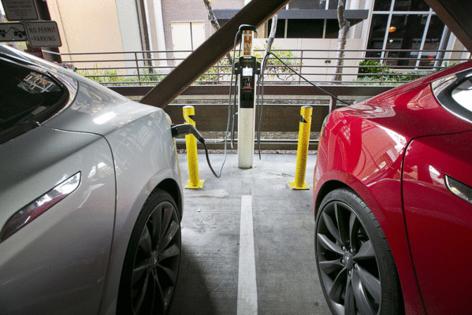In Congressional Review Act first, Senate blocks an EPA waiver after procedural change
Published in Political News
WASHINGTON — The Senate on Thursday passed a joint resolution that would bar California from enforcing vehicle emissions standards that effectively phase out the sale of new gasoline-powered vehicles by 2035.
In a 51-44 vote, the Senate passed a joint resolution that would nullify the waiver issued by the EPA during the final weeks of the Biden administration. Sen. Elissa Slotkin, D-Mich., joined all Republicans in backing the joint resolution under the Congressional Review Act.
The House passed, 246-164, the joint resolution earlier this month with 35 Democrats voting in favor. The White House said in a statement of administration policy that the president’s advisers would recommend that he sign it into law.
The CRA allows Congress to overturn agency rules and bars them from finalizing any that are “substantially the same.” The law also allows the Senate to take that action with a simple majority to avoid a potential filibuster.
The vote Thursday is the first time Congress has used the CRA to nullify waivers. Both the Government Accountability Office and Senate Parliamentarian Elizabeth MacDonough had found that waivers were not rules for the purposes of the CRA.
But in a series of party-line votes late Wednesday, the Senate adopted procedural changes that allow it to bring up a joint resolution of disapproval under the CRA on a waiver. Republicans said their votes avoided breaking Senate precedent by overruling the parliamentarian, but Democrats, referring to the move as “going nuclear,” said it would drastically change how the chamber operates.
“It did not have to come to this. There were many ways around the procedural shortcut of going nuclear where a … majority of the Senate shoves its view on the minority without consideration,” Sen. Sheldon Whitehouse, D-R.I., said on the floor after the Wednesday votes. “That ought to be a last recourse for a desperate majority, but instead it was the first recourse because this is the easy way to do what the fossil fuel industry wants.”
Republicans say the vote on the joint resolution protects federal jurisdiction over vehicle emissions standards. Noting that other Democrat-led states have voluntarily adopted California standards, the Republicans say the waiver allows California to effectively set national vehicle emissions standards.
Republicans also said California’s push toward electric vehicles would reduce jobs.
“These job losses will not be confined to California, but they will be spread all across the nation,” Senate Environment and Public Works Chair Shelley Moore Capito, R-W.Va., said on the Senate floor Wednesday night. “Workers in auto manufacturing, oil and gas production and the agriculture sector across this country would lose jobs because of California’s EV mandate, and the elected officials who represent Michigan auto workers, Nebraska corn farmers or West Virginia gas workers had no say in California and EPA’s decision.”
Groups including the Specialty Equipment Market Association, which represents aftermarket auto part manufacturers; and the Alliance for Automotive Innovation, which counts Ford Motor Co., General Motors Corp. and Stellantis NV, the maker of Chrysler vehicles, among its members, urged members of Congress to support the joint resolution.
The Clean Air Act, first passed in 1970 and subsequently amended, includes a section allowing the EPA to grant waivers that permit states to set their own standards, a carveout to address smog and other forms of pollution.
Congress initially provided California with the waiver authority because the state had demonstrated “compelling … circumstances sufficiently different” from the rest of the U.S. to justify more stringent vehicle emissions standards, according to a report from the Congressional Research Service. The EPA has issued more than 100 waivers since 1970 for California’s air and climate standards.
California Gov. Gavin Newsom, a Democrat, posed Senate Republicans’ approach as a choice in a statement Tuesday.
“The United States Senate has a choice: cede American car-industry dominance to China and clog the lungs of our children, or follow decades of precedent and uphold the clean air policies that Ronald Reagan and Richard Nixon fought so hard for. Will you side with China or America?” Newsom said.
The California Air Resources Board — a panel first established by former Gov. Ronald Reagan — is tasked with enforcing an array of state-level emission control standards. Other states can adopt California standards without a waiver if they meet certain criteria.
Republicans have previously voiced their opposition to the waiver provision. During the George W. Bush administration, the EPA rejected a California application for an emissions waiver, and during the first Trump administration the EPA revoked an emissions waiver for the state using administrative procedures.
But EPA Administrator Lee Zeldin took a different tack this time, transmitting the waivers to Congress in February and asking lawmakers to use the CRA to block them. Republicans said Zeldin’s move started the 60-legislative-day period for the CRA vote.
The Senate is also expected to vote on two other CRA joint resolutions that passed the House: a joint resolution that would nullify a waiver to set stricter nitrogen oxide engine emissions standards, and a joint resolution that would roll back a waiver to set stricter emissions standards on heavy-duty vehicles.
_____
©2025 CQ-Roll Call, Inc., All Rights Reserved. Visit cqrollcall.com. Distributed by Tribune Content Agency, LLC.

























































Comments